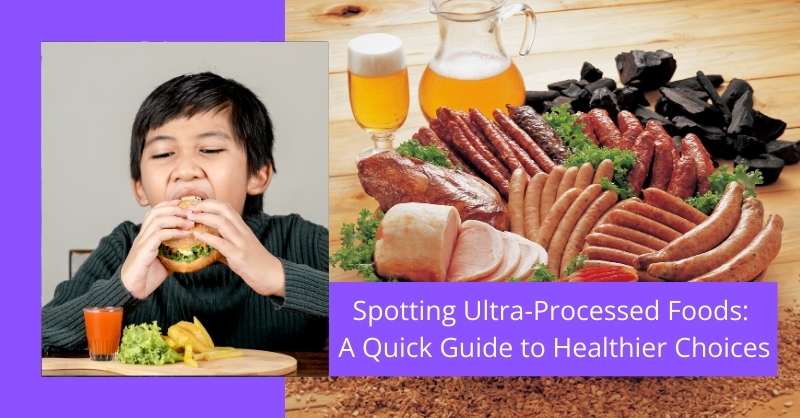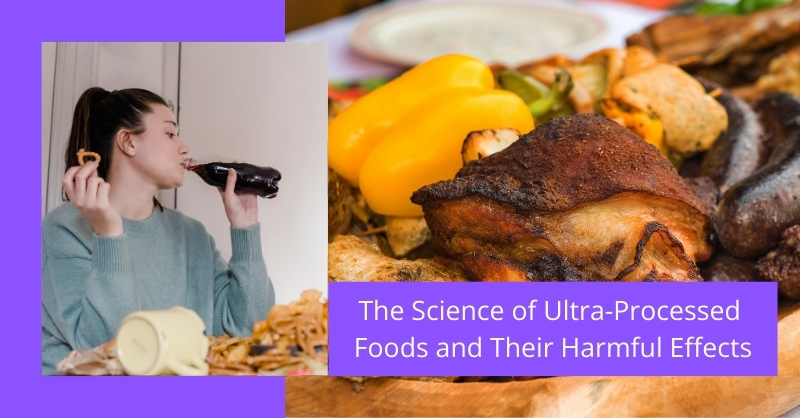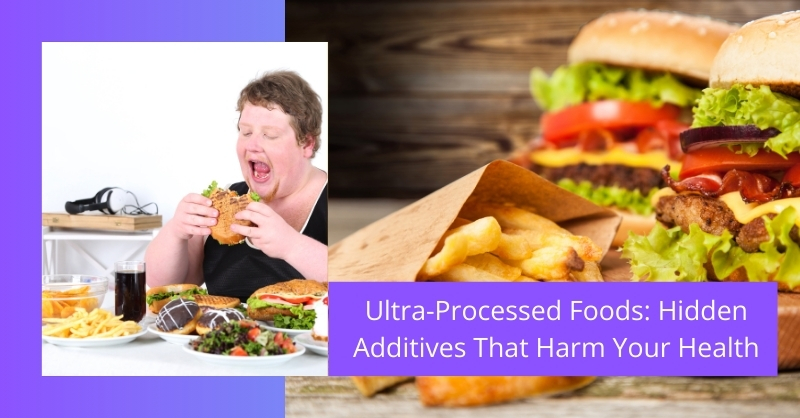In today’s fast-paced world, convenience often takes precedence over nutritional quality. Ultra-processed foods have become staples in many households, but their ease of access and affordability come with a heavy price. Ultra-processed foods and their harmful effects are increasingly being linked to a range of health issues, from digestive disruptions to chronic diseases. Understanding these effects is crucial to making informed dietary choices that protect your health.
What Are Ultra-Processed Foods?
Ultra-processed foods are industrially manufactured products made primarily from substances extracted from foods, such as oils, fats, sugars, and starches, or synthesized in laboratories. These foods undergo extensive processing and often contain additives like artificial flavors, preservatives, and colorings to enhance taste, texture, and shelf life.
Examples of ultra-processed foods include:
- Packaged snacks (chips, cookies, and crackers)
- Sugary cereals
- Instant noodles
- Frozen ready-to-eat meals
- Soft drinks and sugary beverages
The overconsumption of ultra-processed foods has skyrocketed, raising concerns about their detrimental effects on health.
Ultra-Processed Foods and Their Harmful Effects on Digestive Health
One of the most immediate consequences of consuming ultra-processed foods is their impact on digestive health. These foods often lack dietary fiber, an essential component for maintaining healthy gut function. Additionally, the additives and emulsifiers found in ultra-processed foods can disrupt the gut microbiota, leading to issues such as:
- Bloating and indigestion
- Increased risk of irritable bowel syndrome (IBS)
- Impaired nutrient absorption
Understanding ultra-processed foods and their harmful effects on digestion can help prioritize whole, fiber-rich foods that support a healthy digestive system.

Nutritional Deficiencies and Health Risks
Ultra-processed foods are calorie-dense but nutritionally poor. While they may satisfy hunger in the short term, they often lack essential nutrients like vitamins, minerals, and antioxidants. Consuming these foods regularly can lead to:
- Nutritional deficiencies
- Weakened immunity
- Poor skin and hair health
Moreover, studies have shown a strong correlation between the consumption of ultra-processed foods and an increased risk of chronic diseases, including:
Chronic Diseases Linked to Ultra-Processed Foods
Obesity and Metabolic Disorders
The high levels of added sugars and unhealthy fats in ultra-processed foods contribute to weight gain and metabolic disturbances. These foods often have a high glycemic index, leading to rapid spikes and crashes in blood sugar levels, which can increase the risk of developing type 2 diabetes.
Cardiovascular Diseases
Regular consumption of ultra-processed foods is associated with higher levels of bad cholesterol (LDL) and lower levels of good cholesterol (HDL). This imbalance can lead to atherosclerosis, a condition characterized by the hardening of arteries, ultimately increasing the risk of heart attacks and strokes.
Cancer
Research has suggested a potential link between ultra-processed foods and certain types of cancer. For instance, the preservatives and artificial ingredients in these foods may have carcinogenic properties, increasing the risk of colorectal and breast cancer.
Ultra-Processed Foods and Their Harmful Effects on Mental Health
The relationship between diet and mental health is increasingly recognized. The consumption of ultra-processed foods has been linked to higher rates of depression and anxiety. The lack of essential nutrients, combined with high sugar and trans-fat content, can negatively affect brain function and mood regulation.
Additionally, food addiction is a significant concern. Many ultra-processed foods are engineered to be hyper-palatable, making them difficult to resist and leading to overconsumption.
Societal Dependence on Ultra-Processed Foods
The widespread availability and aggressive marketing of ultra-processed foods have made them a dominant part of modern diets. This societal dependence is fueled by several factors:
- Convenience: Ready-to-eat meals and snacks save time, fitting seamlessly into busy lifestyles.
- Affordability: Ultra-processed foods are often cheaper than fresh, whole foods.
- Marketing Strategies: Attractive packaging and targeted advertising make these foods appealing, especially to children and young adults.
Breaking free from this dependence requires a conscious effort to prioritize fresh, minimally processed foods.

How to Protect Your Health
Identify and Avoid Ultra-Processed Foods
Learning to recognize ultra-processed foods is the first step toward healthier eating. Here are some tips:
- Read ingredient labels carefully. Avoid products with long ingredient lists, especially those containing unfamiliar additives.
- Opt for whole foods such as fruits, vegetables, nuts, and seeds.
- Cook meals at home using fresh ingredients to control what goes into your food.
Embrace a Balanced Diet
Replacing ultra-processed foods with nutrient-dense options can significantly improve your health. Consider the following dietary changes:
- Include more whole grains, legumes, and lean proteins in your meals.
- Incorporate healthy fats, such as those from avocados, nuts, and olive oil.
- Stay hydrated with water or natural beverages like herbal teas.
Educate Yourself and Others
Understanding ultra-processed foods and their harmful effects empowers you to make better choices. Share this knowledge with friends and family to promote collective health and well-being.
Final Thoughts
The allure of ultra-processed foods may be hard to resist, but their long-term health implications are far from worth it. By understanding ultra-processed foods and their harmful effects, you can take proactive steps to protect your health and improve your quality of life. Prioritizing whole, nutrient-dense foods and avoiding industrially processed products can pave the way to a healthier future for you and your loved ones.
Small, consistent changes in dietary habits can yield significant benefits. Make the shift today and commit to a healthier, more mindful approach to eating. After all, your health is your most valuable asset—protect it by eating better.
Read this Article: 👉Why Physical Fitness is Essential for a Healthy Life: A Comprehensive Guide
Read this Article: 👉Root Vegetables for Cold Weather: Stay Nourished and Warm This Winter



